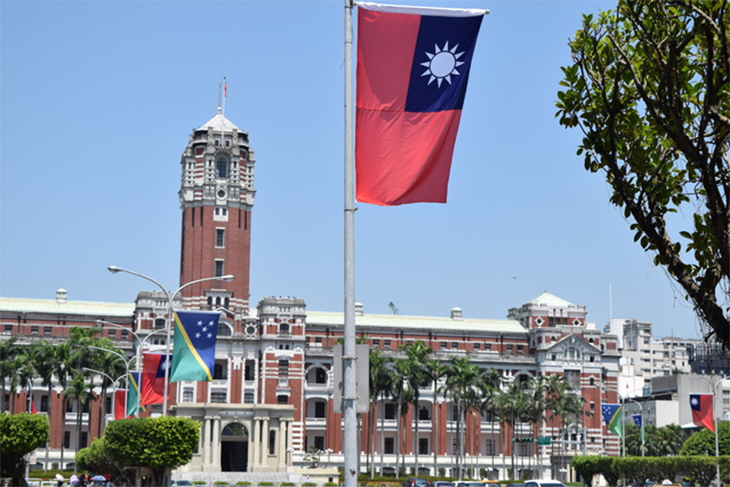The Taiwan Crisis and the Role of Japanese Diplomacy

“[…] as the US-China conflict is escalating from a trade dispute to a military confrontation over the Taiwan Strait, Japan’s diplomatic options with China are steadily narrowing,” the author points out. Photo shows the Office of the President of the Republic of China in Taipei, Taiwan.
Inoue Masaya, Professor, Keio University

Prof. Inoue Masaya
Confrontations between the United States and China over the Taiwan Strait are intensifying.
Since House Speaker Nancy Pelosi’s visit to Taiwan in August 2022, China has stepped up military pressure on Taiwan. General Secretary Xi Jinping (President of China), who was exceptionally elected to a third term at the National Congress of the Chinese Communist Party, held once every five years, in October, has stressed that China will not renounce its right to use force against Taiwan. In response, US officials have stated that China has become more determined to pursue annexation of Taiwan at an earlier time than previously.
It is unclear how much the US is aware of signs of a Chinese invasion of Taiwan. But as the US-China conflict is escalating from a trade dispute to a military confrontation over the Taiwan Strait, Japan’s diplomatic options with China are steadily narrowing. Looking back, 2022 was a year in which the assumptions surrounding Japan’s diplomacy with China changed dramatically both in Japan and internationally.
The first change was the Russian invasion of Ukraine. Until now, any Taiwan emergency was anticipated to be hybrid warfare that combines guerrilla infiltration and cyber attacks. Because of this, there was more interest in China’s manipulation of opinion in liberal countries than in direct war. But the invasion of Ukraine reminded many that a full-scale armed conflict could break out in Taiwan as well. In a survey conducted by the Nikkei in May 2022, 90% of Japanese agreed that preparations should be made in anticipation of a Taiwan emergency. This shows that the tide of public opinion has turned.
The second change was the assassination of former Prime Minister Abe Shinzo. The second Abe administration strengthened cooperation with free countries with an eye to China, while also promoting strategic dialogue with China, building stable yet hardly friendly Japan-China relations. Abe’s strength was primarily the support from domestic “conservatives.” Abe was able to control them even with foreign policy that risked causing their dissatisfaction. By contrast, the Kishida administration cannot ignore the pressure from the “conservatives.” The death of Abe meant the disappearance of the person unifying the Liberal Democratic Party’s right wing, which may complicate the formulation of future China policy. Is there a role Japan can play when faced with US-China relations escalated by the confrontation over the Taiwan Strait?
Strengthening Japan’s defense capabilities to deter China is an urgent issue, but at the same time, looking at Japan-US relations, it is necessary to have discussions that go deeper than just defense cooperation. For example, Pelosi’s visit to Taiwan was more a product of US domestic affairs than strategy. There was a cautious view in the United States that actions unnecessarily provoking China ought to be avoided. With the Biden administration bogged down in partisan conflict, was there no room for Japan to reach out to Washington diplomatically to avoid Pelosi’s visit to Taiwan?
Of course, when Japan was completely dependent on the United States for its security, a stance of preaching solely diplomatic efforts would have been criticized as a “free ride.” But Japan at this time is an important ally to maintain the “power balance” in the Asia Pacific region. The more Japan’s cooperation becomes essential to the defense of Taiwan, the more weight Japan’s position on this issue will carry. Will Japan be able to present its own initiatives to overcome this situation? At the time of the normalization of diplomatic relations between Japan and China in 1972, Japan maintained economic and cultural relations with Taiwan through semi-public organizations while respecting the “One China” principle advocated by China. This Japanese response, referred to as the “Japanese method” by the United States and others, has spread to relations between other Western countries and China. This method, which took form in 1972, has remained in place to this day, despite some later wavering. It will not be easy, but Japan should continue to make use of the wisdom of those who went before us and seek a diplomatic way out of this crisis.
Translated from “Jihyo 2022, Nicchu wa ‘Taiwan kiki to Nihon gaiko no yakuwari (Column on Current Events 2022, The Taiwan Crisis and the Role of Japanese Diplomacy),” Chuokoron, December 2022, pp. 10-11. (Courtesy of Chuo Koron Shinsha) [December 2022]
Keywords
- Inoue Masaya
- Keio University
- Taiwan Strait
- Taiwan
- United States
- China
- US-China conflict
- Taiwan emergency
- Abe Shinzo
- conservatives
- Nancy Pelosi
- diplomacy
- Japanese method